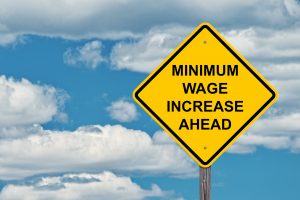* Updated: 3/28/24
Employers across California need to be aware of an increase in the minimum wage for fast-food workers set to go into effect on April 1, 2024. AB 1228, an act to amend Division Two of the California Labor Code, sets new standards for fast-food restaurant working conditions, including health and safety standards, training, and an increase in the minimum wage to $20 per hour. This new minimum wage standard will likely have significant ripple effects across the California labor market.
The April 1st minimum wage increase for fast-food workers will also increase the minimum salary threshold for Exempt Executive, Administrative, and Professional (EAP) employees in fast-food restaurants to $83,200/year. Exempt EAP employees must earn two times the minimum wage.
What Businesses Are Affected by SB 1228?
AB 1228 strictly defines fast-food businesses as “a set of limited-service restaurants consisting of more than 60 establishments nationally.” “Limited-service restaurant” includes, but is not limited to, an establishment with the North American Industry Classification System Code 722513.
These businesses are directly impacted by the decisions of the Fast Food Council. “Limited-service” refers to an establishment offering limited or no table service, in which patrons order or select items and pay before consuming.
The bill excludes, however, limited-service food and beverage establishments that fall under the following categories:
- Bakeries that produce bread for sale as a standalone menu item
- Restaurants located and operated within a grocery establishment, in which the grocery employs the individuals working in the restaurant.
* As of 03/26/24, AB 1228 has been updated to include the additional exemptions:
- Restaurants that are operated in conjunction with larger enterprises such as airports, hotels, large event centers, theme parks, museums, gambling establishments, corporate campuses, and certain public lands. These restaurants generally do not share the same characteristics as traditional fast-food restaurants that are part of national fast-food chains, because restaurants operated in conjunction with larger enterprises have distinct economics and a captive customer base, are often operated subject to concession or food service contracts, and have different employment structures.
While the category of food service establishments directly affected by AB 1228 is narrow, it represents a sizable segment of the industry’s employees and will affect competitive dynamics for full-service and non-franchise establishments as well.
What Does AB 1228 Do?
AB 1228’s primary purpose is to establish and outline the powers and responsibilities of California’s Fast Food Council, a governing body designed to set standards for the fast-food industry, from January 1, 2024, to January 1, 2029.
The most salient part of this bill is that the council has the authority to adjust the minimum wage of fast-food workers. AB 1228 establishes a minimum wage of $20 per hour beginning April 1, 2024 and allows the council to increase this wage annually by as much as 3.5%, or the annual increase in the US-CPI for Urban Wage Earners and Clerical Workers.
This bill also grants the California Fast Food Council authority over health, safety, and employment standards in the industry, prohibits local jurisdictions from setting wage amounts for fast-food employees, designates the council as a government authority, and safeguards fast-food employees from retaliation for participating in council proceedings. Under AB 1228, the task of enforcing the Fast Food Council’s new standards falls to the Labor Commissioner.
How AB 1228 Could Affect the California Business Landscape
The goal of AB 1228 is to improve pay and working conditions for more than 550,000 fast-food workers across California, making workplaces safer and enabling fast-food workers to better provide for themselves and their families and have more disposable income to put back into the state economy. Of course, this will likely not be the only effect an increase in the minimum wage of fast-food workers will have on businesses across California.
Changes to the fast-food minimum wage will likely have a profound effect on competitive dynamics throughout the fast-food industry and the larger restaurant industry as a whole. Other restaurants in the industry may need to consider raising minimum wages or increasing benefits to remain attractive workplaces for workers. Some businesses may have to adjust their hiring plans or staffing strategies to adjust to changes in labor costs.
Fast Food Minimum Wage Frequently Asked Questions (FAQs): CA Department of Industrial Relations (DIR) – https://www.dir.ca.gov/dlse/Fast-Food-Minimum-Wage-FAQ.htm
Effective HR Software with California Payroll
Dealing with changes to state minimum wage and workplace standards is an inevitable part of running and maintaining a business—especially in California, which has the most complex labor laws in the United States.
There are many changes on the horizon for California businesses in 2024. With powerful HR tools ranging from payroll and timekeeping to benefits administration, California Payroll offers flexible solutions for your business to adapt to a shifting regulatory landscape. Speak to a specialist today to learn more about how our solutions can streamline HR and help you maintain compliance and competitiveness.
FAQs
What is the minimum wage for fast-food workers in California in 2024?
The minimum wage for fast-food workers in California will be $20 per hour starting April 1, 2024.
Which businesses are affected by the minimum wage increase for fast-food workers?
Fast-food businesses with more than 60 establishments nationally are affected by the minimum wage increase. This includes limited-service restaurants as defined in the bill.
What authority does the California Fast Food Council have under AB 1228?
The California Fast Food Council has the authority to set standards for the fast-food industry, including adjusting the minimum wage for fast-food workers and establishing health, safety, and employment standards.
What is the minimum salary threshold for Exempt EAP employees in fast-food restaurants?
The minimum salary threshold for Exempt EAP employees in fast-food restaurants will be $83,200/year following the April 1st minimum wage increase.
How might the minimum wage increase for fast-food workers in California impact other businesses in the restaurant industry?
The minimum wage increase may lead to changes in competitive dynamics within the restaurant industry as other businesses may need to adjust their wages or benefits to remain competitive. Some businesses may also need to reevaluate their hiring and staffing strategies.





